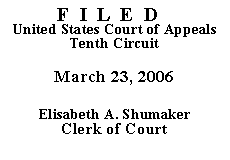

| MICHAEL COFFMAN, |
|
On August 30, 1994, Mr. Coffman pleaded guilty to two counts of running a road block (counts I and II) and to driving under the influence of intoxicating beverage after former conviction of two felonies (count III). On counts I and II, he was sentenced to 20 years imprisonment with 10 years suspended. On count III, he was sentenced to 5 years imprisonment. All sentences ran concurrently. On January 7, 1998, the state district court granted post-conviction relief and modified the sentences on counts I and II to 5 years, and count III to 5 years suspended, all to run consecutively. Upon state application and after a hearing, the court revoked Mr. Coffman's 5 year suspended sentence on May 23, 2003.
Mr. Coffman appealed the revocation arguing in part that the State violated double jeopardy by changing count III to a suspended sentence and subsequently revoking it. The Oklahoma Court of Criminal Appeals ("OCCA") held (1) its review was limited to the validity of the revocation order pursuant to Rule 1.2(D)(4), Rules of the OCCA, and (2) any challenge to the original or amended sentence was required to be brought via a direct appeal or post-conviction procedures, and Mr. Coffman did not appeal the original sentence, or the district court's amended sentence (modified on post-conviction). R. Doc. 15, Ex. 4 at 2.
Mr. Coffman filed his federal habeas petition on November 1, 2005. The district court, adopting the magistrate judge's findings and recommendation, determined that Mr. Coffman's double jeopardy claim was procedurally barred. The magistrate judge determined that Mr. Coffman had not shown cause and prejudice, nor a fundamental miscarriage of justice, that might excuse the procedural bar. See Coleman v. Thompson, 501 U.S. 722, 749-50 (1991); see also Demarest v. Price, 130 F.3d 922, 941-42 (10th Cir. 1997). On appeal, Mr. Coffman contends that the 5-year sentence on count III was discharged prior to the state district court modifying it to a suspended sentence. He argues that this violates federal double jeopardy protection and due process.
Where the district court dismisses a petition on procedural grounds, a COA requires the inmate to demonstrate that it is reasonably debatable whether (1) the petition states a valid claim of the denial of a constitutional right, and (2) the district court's procedural ruling is correct. Slack, 529 U.S. at 484. Mr. Coffman's lack of legal training does not constitute cause for the procedural default because there is no right to counsel in post-conviction proceedings. Coleman, 501 U.S. at 757. Insofar as Mr. Coffman attempts to demonstrate factual innocence that might excuse procedural default, it surely appears that Mr. Coffman had good reason not to appeal the amended sentence as it was beneficial to him overall, reducing the sentence on counts I and II and suspending the sentence on count III. R. Doc. 15 at 6. In sum, the district court's resolution of the procedural issue is not reasonably debatable. As for the due process claim, Mr. Coffman did not raise it below and thus it is deemed waived. See Smith v. Secr'y of New Mexico Dept. of Corr., 50 F.3d 801, 814 n.22 (10th Cir. 1995).
We DENY Mr. Coffman's application for a COA and DISMISS the appeal. Entered for the Court
Paul J. Kelly, Jr.
Circuit Judge